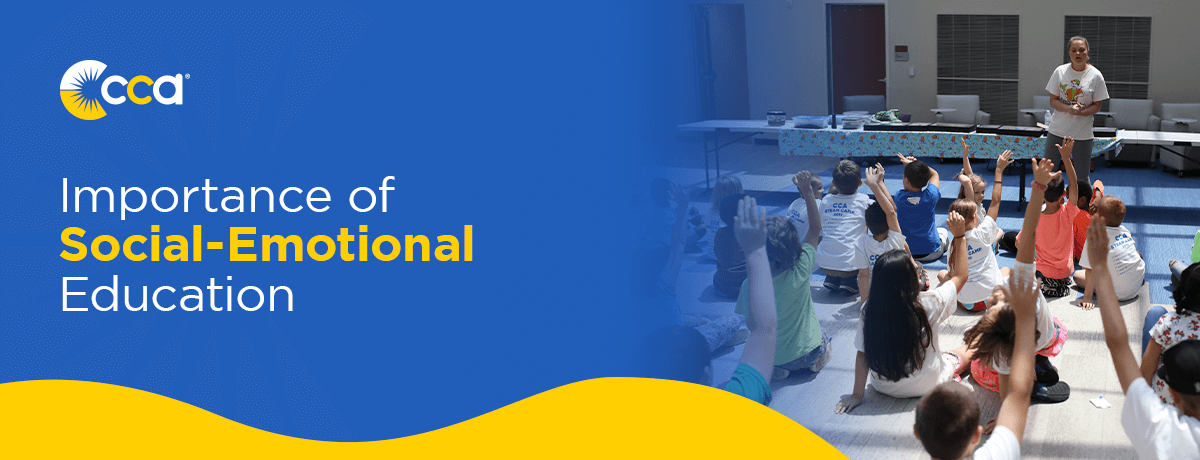Enrollment Now Open for Second Semester. Click Here
Enrollment Now Open for Second Semester. Click Here

Social-emotional learning (SEL) in education helps students develop kindness, empathy, and mental resilience. Incorporating SEL in the learning environment has many short-term and long-term positive impacts. But what is social-emotional learning, and what does it entail? Learn more about SEL and why it’s so important.
SEL is a fundamental aspect of personal and social human development. It’s the process of expanding and utilizing social and emotional skills during real-life situations. These skills are necessary for:
The objectives of SEL are to create a safe learning environment, build students’ abilities to succeed, and foster positive relationships between students. Focusing on SEL in the classroom can reduce bullying. It also gives students the tools to understand themselves and one another.
Effective SEL focuses on helping students develop five basic skills. Some of these five skills have to do with introspection and personal awareness. Others have to do with interpersonal relationships. The five basic skills of SEL are:
When someone is self-aware, they’re able to recognize their own feelings, goals, and values. They can evaluate their own strengths and weaknesses. They notice the ways in which their feelings, thoughts, and actions relate to each other. SEL fosters a growth mindset — which means rather than seeing their limitations as fixed, students recognize their ability to develop new skills with practice.
Self-awareness is necessary for self-management. Someone with strong self-management skills can regulate their emotions and actions. They can manage their stress, control their impulses, and persevere when faced with a challenge. The ability to self-manage helps students make and keep friends. It also gives them the tools they need to achieve their personal goals.
Social awareness extends beyond the self. It involves having empathy and compassion for others, including those with different backgrounds. Understanding your own thoughts and feelings through self-awareness builds a sense of empathy for those around you. Social awareness also has to do with understanding social norms and recognizing social resources.
Relationship skills, such as clear communication, active listening, cooperating, and handling conflict, allow a student to develop and maintain healthy social relationships. Friendships and other positive relationships are vital for mental health and pursuing goals. For instance, having friends to study with can help a student achieve academic success.
SEL teaches students how to make positive choices. Responsible decision-making requires an understanding of:
Social-emotional learning benefits are interconnected, with both short-term and long-term effects. Being able to understand and manage yourself, empathize with others, and make positive choices can have all of the following benefits:
One of the reasons why social-emotional learning is important is that it helps students understand different perspectives. Students learn how to see things from other points of view. This supports kindness towards students who are different, such as those who come from diverse cultural backgrounds or who have disabilities.
SEL allows students to strengthen their decision-making skills. Students build confidence in their choices, making them less susceptible to peer pressure. They learn how to make positive decisions and trust their instincts.
Social and emotional skills affect attitude. A student with well-developed SEL skills is more likely to have high self-confidence and a growth mindset. They’ll recognize their own ability to learn and improve, rather than feeling defeated when challenged. They’ll also recognize the same capability in their peers, resulting in more positive attitudes towards others.
These skill sets are vital for building and maintaining social relationships. Social success depends on abilities such as:
In addition, self-awareness and impulse control are vital for making the best decisions in relationships, allowing students to keep the friends they make.
SEL helps students manage and decrease emotional distress. Every student faces stressful or difficult situations at one point or another. Having the tools to manage stress, set realistic goals, and utilize social resources can help a child cope with their emotions.
Social and emotional skills help a child succeed in school. Being able to use social resources, including peers and teachers, allows a student to gather tools for success. In addition, the ability to regulate emotions and make positive decisions helps a student achieve their academic goals.
Given these benefits, schools focus on SEL in the classroom and beyond. Students with well-developed social and emotional skills foster a more positive learning environment for everyone. Teachers can use many different strategies to help students of any age develop socially and emotionally. SEL helps students grow into well-rounded, confident, and empathetic individuals.
At the Commonwealth Charter Academy (CCA), we understand the importance of SEL. Although we provide an online learning environment, we offer many opportunities for socialization, including:
These opportunities teach students how to create positive relationships with their peers. They encourage collaboration and allow students to have fun while working together. Community volunteering events promote empathy, while clubs and activities give students the chance to speak publicly and work with a team.
While students are developing social and emotional skills, they’re also exploring career opportunities and learning about the world around them. Hands-on social activities are a necessary component of anyone’s education. We also have a Family Services Department to facilitate the transition to cyber school. Students and their parents can ask questions and seek useful advice.
School is about more than academic learning — it also promotes social and emotional development. SEL is necessary for a student to create relationships, set and achieve goals, and make the most beneficial decisions. At CCA, students have many chances to engage and collaborate with their peers.
CCA’s student events provide an environment for social and emotional learning. In addition, these events give students the chance to learn about new and exciting topics in a hands-on way or jump-start their post-school careers. They also provide an outlet for physical energy and offer fun ways to get active. To learn more about CCA’s socialization opportunities, contact us today.
Enrollment Now Open for Second Semester. Click Here